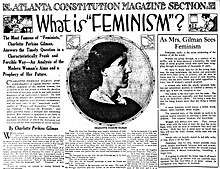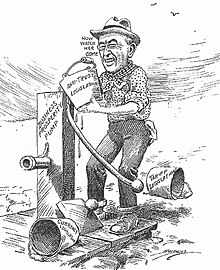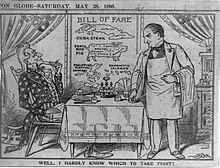Progressive Era
Multiple overlapping movements pursued social, political, and economic reforms by advocating changes in governance, scientific methods, and professionalism; regulating business; protecting the natural environment; and seeking to improve urban living and working conditions.
[9] An additional goal of progressives was bringing to bear scientific, medical, and engineering solutions to reform government and education and foster improvements in various fields including medicine, finance, insurance, industry, railroads, and churches.
In the beginning of the age of mass media, the rapid expansion of national advertising led the cover price of popular magazines to fall sharply to about 10 cents, lessening the financial barrier to consume them.
Muckraking magazines, notably McClure's, took on corporate monopolies and political machines while raising public awareness of chronic urban poverty, unsafe working conditions, and social issues like child labor.
Many subscribed to Andrew Carnegie's credo outlined in The Gospel of Wealth that said they owed a duty to society that called for philanthropic giving to colleges, hospitals, medical research, libraries, museums, religion, and social betterment.
The conservative supporters of President Grover Cleveland were routed and Democrats nominate Bryan on a platform of "free silver", which hopefully would make money available in the deeply depressed economy, hurt the nasty gold-hoarding bankers and uplift the honest workers and farmers.
[43] President Theodore Roosevelt was a leader of the Progressive movement, and he championed his "Square Deal" domestic policies, promising the average citizen fairness, breaking of trusts, regulation of railroads, and pure food and drugs.
As Associate Justice of the Supreme Court, he often sided with Oliver Wendell Holmes in upholding popular reforms such as the minimum wage, workmen's compensation, and maximum work hours for women and children.
His political philosophy influenced many leading progressives including Theodore Roosevelt, Adolph Berle, as well as his close friends Judge Learned Hand and Supreme Court Justice Felix Frankfurter.
[83] While the majority of North Carolininans continued to support traditional gender roles, and state legislators did not ratify the Nineteenth Amendment until 1971, Progressive reformers like Gertrude Weil and Dr. Elizabeth Delia Dixon Carroll lobbied for woman suffrage.
[89] Between 1901 and 1911, Progressive Republicans in Wisconsin created the nation's first comprehensive statewide primary election system,[90] the first effective workplace injury compensation law,[91] and the first state income tax,[92] making taxation proportional to actual earnings.
The working class saved money by walking to their factory jobs; municipal reformers appealed to the middle-class vote, by attacking the high fares and mediocre service of privately owned transit companies.
They often proposed city ownership of the transit lines, but the homeowners were reluctant to save a penny on fares by paying more dollars in property taxes [114] Dayton, Ohio, was under the reform leadership of John Patterson, the hard-charging chief executive of National Cash Register company.
Progressives advocated censorship of motion pictures as it was believed that patrons (especially children) viewing movies in dark, unclean, potentially unsafe theaters, might be negatively influenced in witnessing actors portraying crimes, violence, and sexually suggestive situations.
Progressives across the country influenced municipal governments of large urban cities, to build numerous parks where it was believed that leisure time for children and families could be spent in a healthy, wholesome environment, thereby fostering good morals and citizenship.
This involved vacant lots in the suburbs being used in parcels upon which, as noted by one study, “potatoes and garden truck were planted and cultivated by needy families under the supervision of a committee, funds being raised by subscriptions and the use of the land permitted by its owners.” Many other cities went on to adopt Detroit’s plan.
During the Progressive era, female activists used traditional constructions of womanhood, which imagined all women as mothers and homemakers, to justify their entrance into community affairs: as "municipal housekeepers," they would clean up politics, cities, and see after the health and well-being of their neighbors.
Donning the mantle of motherhood, female activists methodically investigated their community's needs and used their "maternal" expertise to lobby, create, and secure a place for themselves in an emerging state welfare bureaucracy, best illustrated perhaps by clubwoman Julia Lathrop's leadership in the Children's Bureau.
As part of this tradition of maternal activism, the Progressive-era General Federation supported a range of causes from the pure food and drug administration to public health care for mothers and children, to a ban on child labor, each of which looked to the state to help implement their vision of social justice.
[163][164] Typical projects involved upgrading schools, modernizing church operations, expanding business opportunities, fighting for a larger share of state budgets, and engaging in legal action to secure equal rights.
The institution of the initiative and referendums made it possible to pass laws without the involvement of the legislature, while the recall allowed for the removal of corrupt or under-performing officials, and the direct primary let people democratically nominate candidates, avoiding the professionally dominated conventions.
The result, according to political scientist Henry Jones Ford, was that the United States Senate had become a "Diet of party lords, wielding their power without scruple or restraint, on behalf of those particular interests" that put them in office.
There were about a dozen members of this group, including William Borah of Idaho, George W. Norris of Nebraska, Robert M. La Follette Jr. of Wisconsin, Gerald Nye of North Dakota, Hiram Johnson of California and Bronson M. Cutting of New Mexico.
The Panic of 1907 was followed by a small decline in real wages and increased unemployment, with both trends continuing until World War I. Campbell emphasizes the resulting stress on public finance and the impact on the Wilson administration's policies.
Wilson proved especially effective in mobilizing public opinion behind tariff changes by denouncing corporate lobbyists, addressing Congress in person in highly dramatic fashion, and staging an elaborate ceremony when he signed the bill into law.
It included, in addition to the rapid building of a public school system based on English teaching, and boasted about such modernizing achievements as: steel and concrete wharves at the newly renovated Port of Manila; dredging the River Pasig; streamlining of the Insular Government; accurate, intelligible accounting; the construction of a telegraph and cable communications network; the establishment of a postal savings bank; large-scale road- and bridge-building; impartial and incorrupt policing; well-financed civil engineering; the conservation of old Spanish architecture; large public parks; a bidding process for the right to build railways; Corporation law; and a coastal and geological survey.
[242][243] The Presbyterians described the goal in 1910 by proclaiming: The great ends of the church are the proclamation of the gospel for the salvation of humankind; the shelter, nurture, and spiritual fellowship of the children of God; the maintenance of divine worship; the preservation of truth; the promotion of social righteousness; and the exhibition of the Kingdom of Heaven to the world.
Their endeavor is to overthrow and discredit all who honestly administer the law, to prevent any additional legislation which would check and restrain them, and to secure if possible a freedom from all restraint which will permit every unscrupulous wrongdoer to do what he wishes unchecked provided he has enough money....The methods by which the Standard Oil people and those engaged in the other combinations of which I have spoken above have achieved great fortunes can only be justified by the advocacy of a system of morality which would also justify every form of criminality on the part of a labor union, and every form of violence, corruption, and fraud, from murder to bribery and ballot box stuffing in politics.
[258] Timberlake (1963) argues the dries sought to break the liquor trust, weaken the saloon base of big-city machines, enhance industrial efficiency, and reduce the level of wife beating, child abuse, and poverty caused by alcoholism.
Palmer, pointing to leaders like George Norris, says, "It is worth noting that progressivism, while temporarily losing the political initiative, remained popular in many western states and made its presence felt in Washington during both the Harding and Coolidge presidencies.












